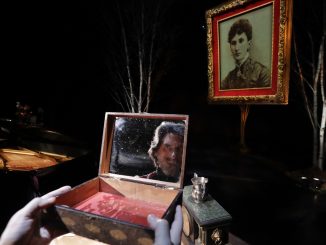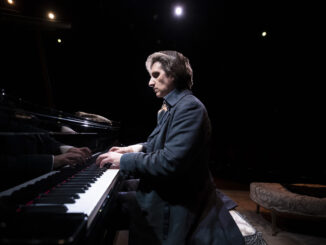
Once again Hershey Felder tells a fascinating and lesser known story. In his new production, a movie, “The Story Behind the Verdi Traviata”, filmed on location where the actual events took place in Venice, Italy and at Villa Verdi, Giuseppe Verdi’s home which remains exactly as he left in in Busseto, the story behind the opera is told. Felder wrote the script, co-directed and stars as Verdi. This wonderful movie Is streaming until April 10th.

For me, the movie presented an opportunity to get away from the worries of the world, experience Venice, Italy from home, to enjoy exquisite music and to learn more about a composer in his time. Enriching the production as they star as the original performers in “La Traviata” are opera singers Charles Castronovo, Ekaterina Siurina and Mark Delavan.
Felder shares that “In 1853, in Venice Italy, Giuseppe Verdi on his way to becoming Italy’s most beloved and famous composer, premiered his opera, LA TRAVIATA (The Fallen Woman). It is the emotional story of a young courtesan who finally finds love with one man but is riddled with an illness that will soon take her life. With soaring glorious music, it is now said, that every night somewhere in the world, LA TRAVIATA is being performed. But at its premiere, it was laughed at, booed and heckled. This is the story of what happened.” See it streaming on demand and enjoy.

Plus two weeks on-demand viewing. Continuous viewing of Season 1 & 2 with purchase of entire Season 2
LA TRAVIATA changed opera in that it is the first opera to be based on real life. Today it is among the three most performed operas worldwide. But Verdi in his later years explains that everything went wrong when it premiered and somehow when it was introduced again at a later time it was enthusiastically applauded. In this film there are some of the most beautiful arias in all opera. The music was enhanced by equally breathtaking views of Verdi’s home, gardens and views of Venice.

Would a story about a courtesan dying of consumption sung by a soprano too “ample” to be consumed by anything, and a cast of characters that seemed to have wandered into the theatre off the street, survive the most vicious public shaming that an opera had ever seen? Could it be that an open wound of hypocrisy, misogyny and sexual politics at the heart of European society was exposed that it was not initially appreciated? By revealing it for his audiences, in creating that problematic but indelible “pity” for Violetta through his music, Verdi confronted head-on some of the social difficulties in his own life as well.

Violetta’s death scene recalls the real-life death scene of 18 June 1840, when the young Verdi’s 26 year old wife Margherita died in her father’s arms, with her husband and doctor present. Although consumption is not our current plague, is there not an echo in society of hypocrisy, misogyny and sexual politics making this film meaningful for today?

Remarkably, Felder brings the viewer to a time that is distant and yet present. It is a beautiful film with all the beauty of Verdi’s music, a wonderful orchestra, voices that are a joy to hear, costumes and scenery that delight, and a story that is at once accessible and fascinating.

Photos are courtesy of Hershey Felder Productions




Be the first to comment